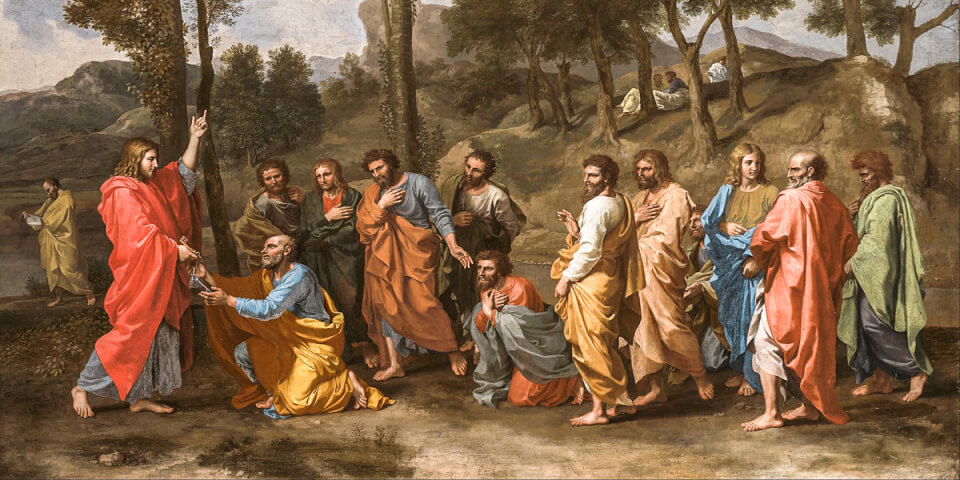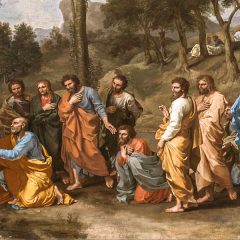love
A School Of Love

6th Sunday Of Easter
Fr. Mark Gatto
Preached: May 5, 2024
Recently, I was at one of the sessions for the formation of Permanent Deacons, as I am the Director of Formation for Permanent Deacons in our Diocese. This year we have one candidate who just had a new baby. On these Saturday sessions, the wives normally join their husbands and we have Mass half way through the Saturday session.
This couple brings their new baby to the sessions as she is breast feeding. I was celebrating the Mass that day. After distributing communion I went down to bring communion to this wife who was holding her baby. As soon as I gave her communion I realized that the reason she could not come forward is that she was breast feeding her baby. This is the first time I think I have given communion to a mother while she was breast feeding!
But, what a wonderful connection. In communion, it is Jesus, the bread of life, feeding us from his very life just as this mother was feeding her child from her very self. We can really speak of the Mass as a school of love.
In John’s Gospel we hear Jesus say to his disciples, “You are my friends.” This is how God speaks to us through Jesus. Calls us friends. In the reading from the first letter of John, it simply says, “God is Love.”
There is a lot of discussion today about education, and in particular, Catholic education. The most important education that is needed for humanity, for each person to become a fully alive human being, and for the human world to become a place of peace, is education in love.
Jesus, is the model of the human being. In Jesus we see the model of self-giving love. He says, “No one has greater love than this, to lay down one’s life for one’s friends” In Jesus we have the great teacher and model of love. In the Mass we enter into a school of love with Jesus.
In the Mass we spend time with Jesus and there we are able to be educated in love. The church
teaches that we experience Jesus in four ways at the Mass.
First, we experience Jesus in the Blessed Sacrament, the bread of life in which we receive the real presence of Jesus. Like a mother breast feeding, Jesus feeds us with his very self.
Second, we experience Jesus in the Word of God proclaimed. Jesus is speaking to our hearts. The challenge for us, like in any relationship, is to learn to listen. To pay attention to what Jesus is saying to us through these readings. To do this well it is helpful for us to read and pray with the readings for Sunday during the week before the Mass.
Third, in the priest presiding at Mass, we are to experience Jesus gathering us together. The priest is a sacrament of Jesus. Of course, we priests are very ordinary human beings, so the challenge is to see through faith to Jesus working through us. The challenge for each priest is to try to reflect the self-giving love reflected in Jesus, as we give our life away in service. Of course, be patient with us in our weaknesses!
Fourth, we experience Jesus in the Assembly, the people of God gathered together for the Mass. For the church is called to be the body of Christ. Sometimes this is also hard to recognize. But, we need to keep awake to the presence of Jesus.
An example is when a baby is crying or children are distracting, instead of seeing that as a distraction at our Mass, we should open ourselves to recognize Jesus in that distraction. Years ago in a previous parish, I remember a young boy who wanted to be an altar server. He had some form of attention deficit and was very restless. He just could not sit still. But, he was so excited about being able to serve at Mass.
After Mass one elderly woman who usually sat behind the servers came to me as she was very bothered by this restless server. She said he was disturbing her Mass and wanted me to remove him as a server. The self-giving love reflected in the Mass had become a self serving thing for this woman. She was failing to recognize Jesus with her in the assembly, including this restless boy serving at Mass.
In fact, for me as a priest, one of the most important ways that Jesus is with me is through you the people of our parish. Jesus is the model of our humanity, the vision of self-giving love. The Mass can be a school of love for us. We need to allow Jesus to be with us and to spend time with Jesus at the Mass.
Coming to us in the Blessed Sacrament, speaking to us in the Word, guiding us in the priest presiding and also present to us in the assembly of the People of God gathered with us. God is love. The Mass is a school of love in which we are nourished by God as a baby being fed is nourished by its mother.
Genuine Charity

Second Sunday of Easter – 2024
Fr. Peter Robinson
Preached: April 7, 2024
This past week, I heard the heartbreaking story of an Afghani woman, living now as a refugee in Canada. She and her family fled from the Taliban to our country, but as they were leaving Afghanistan, her husband died of cancer. She continued on alone, into the unknown, with her three small children. Sadly, she arrived here with an illness that has left her half-blind. She now lives with her children in a small apartment with one bedroom. She is not a Christian, as you would guess, and she barely speaks English. However, one thing that comforts her is that her children are not growing up back home, under the repression and persecution of the Taliban.
Now, let’s bring our attention to our First Reading from the Book of Acts. We are travelling back almost 2000 years ago, to a time when the earliest followers of Jesus (living in Jerusalem) were surrounded with the aching needs of the poor. We catch a glimpse, in the Book of Acts, of the life of that earliest Christian community. What was it like? Our author, St. Luke, stresses in today’s text the unity of that Jesus-community, coupled with their mutual caring, so that no one in their parishes was in want.
As you know, this care of people in need (particularly in financial matters) remains a strong challenge for the Catholic Church today; just as care for the needy is a huge emphasis throughout the Bible. We see such care beginning with the earliest Law-codes of ancient Israel; and that focus continues through to the Letter of James near the close of the NT. And it continues beyond.
Why? What compelled the ancient Jewish people — as well as us Catholics today — to care for those with less? Why do our hearts, for example, immediately go out to a nameless stranger, from Afghanistan, who is on the very edge of poverty — right here in our own country?
Here our second Reading from the 1st Letter of John answers our question. The short answer is charity. But … there are two overarching aspects of Christian love, of charity; two aspects that are vital for genuine love.
1st, genuine charity is built on faith in Jesus as Son of God. You see, although we live in a beautiful world, there are dynamics in this world that are evil. There are god-less attitudes which stand in opposition to Christian values. Yet by raising Jesus from the dead, God has shown the vanity (the ultimate futility) of those attitudes. Rather, when we choose Jesus’ example, at all cost, we experience the victory of Christian love. This is not just the abstract or romantic notion of love, but the conquering of charity.
2nd, genuine love will see us resurrected at the end of this age, as daughters and sons of God. I often point out at funerals that the most important question we will ever answer is at the close of this life. When we stand before Jesus, and he asks each of us, “Why should I let you into my heaven?” what will we then say? Our favourite sports teams will be long gone; the house, the cottage, the new car will no longer matter; all of our relationships will have ended. So, our answer (our only answer) can be that our goal in life was to become like the Christ who is asking us that critical question.
You see, it is through our baptism that we become children of God. Through baptism we are able to cry “Abba, Father” — which was how an ancient Hebrew child addressed her or his father. What is more, as we do the works of charity in Jesus’ name, we become and more like him, too.
Where I grew up, south of Algonquin Park, almost invariably the old farmhouses and barns would have a lightning rod (a lightning conductor) on the metal roof. It was linked by a chain to the ground, where it was “grounded” or “earthed.” A lightning strike would follow the line of least resistance, and spare the wooden structure.
Using this illustration a Catholic mystical writer, that I enjoy, puts it this way: when our love remains open to God, and for long enough, then his Holy Spirit uses our love as a “spiritual lightning conductor” (as a lightning rod) to purify our hearts, and even our bodies. We become gradually “spiritualized” — that is, Christlike.
So, you see, as we live lives of charity, the resurrected Jesus lives his life, more and more, in your hearts and bodies and in mine. This means that, here in Hamilton, we too can become like that early Church in the Book of Acts …
………..
Torkington, David John. The Primacy of Loving: The Spirituality of The Heart (pp. 198-99). Collective Ink. Kindle Edition.
Let’s Start Building!

7th Sunday Ordinary Time
Deacon Tom Vert
Preached: Feb. 19, 2023
Today we are going to build!
As you know, we are in the final stages of building our new church which we will be entering some time this summer.
It is amazing to watch the progress, from a field of weeds to foundations, steel structure, walls, etc.
Each week another building block to the final completed structure.
I was looking closely these past few weeks at the limestone walls that are being bricked both outside and inside the church, thinking about the similar beautiful stone churches of Europe and our own Cathedral here in Hamilton.
So, I went to my basement, and I looked for a book that I knew would help me understand the building structure and set the theme for this homily – something truly appropriate – and I found it – “Design and construction of Stone buildings”.
So, let’s begin building…
If we start from the ground up, we are told in our design book that the church must be built on bedrock and with a solid foundation. If the foundation is wrong – then the structure will always be inherently weak and susceptible to failure.
In our new church we have a solid concrete foundation and over 100 piers sitting on the bedrock underneath, to ensure that no matter what forces act upon it, the floor will always be solid, the walls will always be steady, and it will not crack.
In life, we also need these strong piers and walls of faith, so that no matter what trials and struggles and challenges come in our lives, the most important thing we can do is to look to God. We are called to connect with the foundation, to put our faith and trust in the bedrock and seek God’s favour and protection.
We are to praise God for His faithfulness in the past and ask Him to be with us in the future, to be recipients of God’s love and mercy.
This is the phrase in the psalm we have sung today – “Bless the Lord, O my soul…bless his holy name”. The psalmist thanks God for his kindness and mercy and forgiveness. The psalmist reminds us to see God acting in our lives and thank him in our prayers for the things he continues to do for us each and every day.
The next most important thing in building a church of stone are the stones themselves!
We are told in our engineering construction guide – that we are to build with “good durable stones” – these are key properties that will enable a long durability of a structure.
In our new church, we had a choice between concrete brick, clay brick, simulated limestone or natural limestone from the Bruce Peninsula in Ontario near Tobermory. We had a vision of a church that would last over 100 years, so we wanted good durable stones and chose the natural stone option. If you drive by and see the walls that are being built, I think you will agree that it is not only solid, but also beautiful.
It is great to watch the brick masons lifting the bricks into place and it reminds us of lifting spiritual bricks onto our walls of faith. I want you to picture the walls of the new church and yourselves lifting the stones onto them. Then, use this to lift up spiritual rocks in your life like we hear in the readings today.
Lift up the rock of patience when someone verbally or emotionally “strikes you on the cheek” and put it onto the wall.
Add on a stone of humility as St. Paul tells us counting on God’s wisdom and not our own.
Raise up another stone of kindness when you are asked for help even when you are tired and walk two miles with joy with their request.
You will continue to go higher with rocks of trust and truth, kindness, and joy.
Each stone we lift is a step upwards in holiness! Be holy as I am holy, be perfect as I am perfect. The meaning of this is actually to be complete and whole, to be who God meant you to be, with the gifts that He gave to us. As St. Catherine of Siena has taught us “be who God meant you to be and you will set the world on fire!”
St. Peter tells us that we are living stones in the faith and to be an active part of the building process – and that is the challenge we have each day.
Finally, as we build our church, we are told that we have to ensure the mortar is right – too much water, too much sand or cement and it will break down over time and as the mortar falls out, the rocks will begin to loosen and the walls may crumble.
Good mortar and good rock are a great combination as the mortar will cement itself into the pores of the rock and form a bond that cannot be broken.
The mortar in our spiritual building is of course love!
St. Paul is so insistent that no matter what you do, how much you do – if you do not do it with love – it means nothing! If the mortar is poor, no amount of it or fancy trowelling will improve it.
Without love what you do is selfish and individual – love can never begin with “what’s in it for me?
Love looks outwards – “what is best for you?” “What would help you?”
Love starts with the needs of the other and we see this so clearly in the gospel stories especially when Jesus tells his disciples during the last supper “love one another as I have loved you!”
Jesus challenges the people and us to stretch this not only to those friends and family, but also to love our enemies!
The greatest example of this his washing of the disciples’ feet – the job of a slave or servant – but one that he did to teach his disciples – sacrifice your own needs no matter how great you might be, no matter how much money or power you may have – and put others first.
Agape love is talked about here, self giving love like Christ. Pray for others, help them as much as you can, show Christ’s love for others in your life…and we can only do this with God’s help.
Yes, our new church is shaping up well as we make the final push to completion, step by step.
With Lent starting this Wednesday, you may want to ask yourself about your personal building:
- How solid is my foundation of faith and my gratefulness for what God has done for me?
- How durable are my stones? How many more stones of kindness, patience, gentleness can I lift up on my walls?
- And how crumbly is my mortar? Do I have more love to give to those around me?
Yes, the challenges that God gives are big, but just think, it’s okay because today we are going to build!
The Test Of Our Catholic Faith – Will You Pass?

7th Sunday Ordinary Time
Fr. Mark Gatto
Preached: February 20, 2022
“Love your enemies, do good to those who hate you.” Any Christianity that does not take this teaching seriously is superficial and self serving. In fact, the test of our Christian Faith is not if we go to church on Sunday, but do I love my enemies, have I removed hate from my heart?
This is the non-violent vision of Jesus. It is a way of being in this world, a way of being in relationship with our fellow human beings. It is a way of speaking, a way of disagreeing, a way of fighting for justice that rejects violence. It is a way of facing hatred and division without becoming hatred.
In our world today, division, polarization, hatred are all so prevalent. We see divisions between nations, in the news today we see the situation in Ukraine, but we can look throughout our world and see so many examples of division and opposition between nations. Within our families we see so many cases of division and separations.
Within our church we see real polarization, with one group attacking another. We just have to go on Catholic Twitter to see that. Our challenge is to face all of this without giving in to hatred within ourselves. This non-violent vision is not passive. We face evil, we confront injustice, but never with violence, nor with vengeance.
The greatest obstacle to us embracing Love of our enemies is fear. Thomas Merton said, “fear is the root of all violence.” We need to be aware of our fear, what causes me fear. When I do not recognize fear within myself, then I will simply respond, “I hate you.” We need to say rather, “I am afraid.”
When someone is racist, it is usually rooted in a deep fear of those who are different or of losing some privilege. When countries go to war, it is often rooted in fear, fear of losing something, fear of the other which has often been formed over history. When someone is xenophobic and attacks immigrants or refugees, it is usually rooted in fear of losing something or of those who are different. We need to be aware of what we fear. I need to say, “I am afraid” rather than “I hate you.”
When we are fearful, our response is to strike out, attack, destroy the other. Anger inside of us is usually rooted in deep pain, from hurts within us. Over the years in a parish, I have often spoken to office staff about dealing with angry people. I would tell them not to take it personally and realize that when someone is reacting in such anger it is usually rooted in some deep pain they have within, that might not even be related to the present situation. It is for this reason that Martin Luther King said, “hate cannot drive out hate, only love can do that.”
Our mission as the Catholic Church in the world today, our mission as disciples of Jesus today, has to include being instruments of peace. The way we speak, the way we oppose injustice, the way we share our faith, it has to be in a non-violent way. We need to overcome fear, not be guided by fear. Fear is a terrible spiritual director.
We need to be instruments of peace in our families, in our church, on social media, in our world. To be such an instrument of peace we first of all need to find peace within ourselves, we need to struggle to overcome fear and hatred within ourselves.
The God whom Jesus revealed rejects all forms of vengeance and demands no victims. This Kingdom of God means the complete elimination of every form of violence between individuals and nations.
Become instruments of peace, our world desperately needs instruments of peace. The survival of our world and of humanity depends on this.
Perhaps my favourite prayer is known as the Prayer of St. Francis. “Lord, make me an instrument of peace. Where there is hatred, let me sow love.” It goes on to say, “grant that I may not so much seek to be understood, as to understand.” We all want to be understood, we want others to understand how I am feeling, what my views are and so on.
But, the way of the Gospel requires that we first of all try to understand the other person first, what they are feeling, what they are thinking, how they may be hurting inside. It is this dying to self that allows us to be an instrument of peace.
“Love your enemies, do good to those who hate you.”
This is the key test of our Catholic Faith. By overcoming fear and hatred within myself, then it is possible for me to become an instrument of peace.
What The World Needs Now Is Love

4th Sunday Ordinary TIme
Deacon Tom Vert
Preached: January 30, 2022
“What the world needs now, is love, sweet love, it’s the only thing that there’s just too little of!”
This song was written back in the 1960’s in a time of turmoil, the Vietnam War, and society in upheaval.
It was a song that tried to bring a better perspective, one that said we don’t need more mountains or hills, or fields, but “Lord, if you want to know, what the world needs now is love”.
With all the world has going on right now, and the second reading today from Corinthians, it struck me that this is a message so appropriate for this moment.
We have:
- Truckers protesting across the country about vaccination mandates
- We have people vaccinated upset with people who are not
- We have Europe on the brink of another war in the Ukraine with Russia
- We have migrants trying desperately for a better life who are freezing on our own borders
- We have more financial inequality than almost any time in recent history
- And on social media, everyone is ranting about all the above and more
What do we truly need right now? What is there too little of?
The second reading tells us a path forward.
It’s interesting that this letter from Paul to the Corinthians and was also written at a time of turmoil in the church in Corinth.
Every one of us has heard this reading probably 20 or more times at weddings including my own wedding 31 years ago.
And when we hear it, it is kind of nice and cute, warm, and fuzzy. But as I was researching this homily for the weekend, I got a new perspective
I think it is the second most challenging reading in the New Testament right after the Beatitudes, and really caused me to look at my spiritual life more closely.
It starts off with “strive for the greater gifts” and I love this because the word strive is an action word and shows us that we are to actively strive to improve our faith life.
It goes on to say that “If I speak in the tongues or prophetic powers, or have all knowledge, and faith, but do not have love, I am nothing.”
St. Paul speaks to the motivation of the heart in our actions, and it is key that any outward show gains nothing, but inward love to another means everything!
Extraordinary gifts, grand abilities, skills, or actions are empty without love and can even be seen hypocritical if not authentic. When love is missing, it can become vain, selfish, fruitless, and individualistic.
Love’s quest can never begin with “what’s in it for me” but always “what is best for you”.
St. Paul then gives us the list of 12 challenges:
“Love is patient”, which focuses us on allowing another person to take the time they need; it’s not on my timeline.
“Love is kind”, which speaks to gentleness, mercy and compassion, putting ourselves in the other person’s shoes and trying to understand before we judge.
“Love is not envious or resentful”; life is not a competition, either at work or in our families where everyone can succeed. We are not to be upset that others get something I didn’t, or won a award, received recognition, promotion, wage increase, or resent another’s success or skills. Instead, we are to rejoice in another person’s achievements instead of wishing it was us. Just because another’s candle is brightened, doesn’t mean ours doesn’t shine also.
“Love is not boastful or arrogant”; in other words, if I have achieved more, I don’t show off, I don’t say look at me, but instead we are called to be humble and use the gifts God gives us for the community are the way forward.
“Love is not rude”; it doesn’t close its’ ears and shortchange the other person in conversation but listens and hears and acknowledges another.
“Love does not insist on its own way”; it is not focused on how I get what I want when I want it, but instead how can we work together to get the best result.
“Love is not irritable”; it is not grumpy, edgy, or impatient, but instead it is kind, gentle and forgiving.
“Love does not rejoice in wrongdoing but rejoices in the truth.” We are called to seek and bear witness to the truth using faith and reason and not to get caught up in conspiracy theories or the latest social media rants.
“Love bears all things”; I found these four words from St. Paul a true challenge as we are called to bear with worries, stresses, sickness, poverty, loneliness, for ourselves and those we support, without complaining. That is not easy as we have our own limits with patience, and we get tired; but we are called to rely on God’s strength and not our own.
“Love believes all things”, by faith in God that his will be done, “Love hopes all things” as we hope for a better future, and end of war, and end to the pandemic, and “Love endures all things” with the power provided by the Holy Spirit.
“Love never ends.”; As long as we are alive, the fruit of love is still there and can give us energy to push forward as we can always love when we are connected to God as He is the source of love.
“And now faith, hope, and love abide, these three; and the greatest of these is love.”
These three are the heart of the Christian life – faith, hope and love – faith in what God has done, hope in what God will do, and love of God is to trust that his plan and timing are the right ones, and we accept them.
God’s love for us, becomes the driver of our love of others. We are to love the Lord your God with all your heart, strength, soul and mind, and His love then enables us to love your neighbour as yourself.
The final thing St. Paul says, in the next two words of this letter which we didn’t read today: “pursue love!”
This is the message and thought for the week ahead; when you read the paper, listen, or watch the news, sing this key phrase to yourself and you will know how to react:
“What the world needs now, is love, sweet love, it’s the only thing that there’s just too little of!”
Where Is Your Heart?

21st Sunday In Ordinary Time
Fr. Mark Gatto
Preached: August 22, 2021
Who or what do you serve? Who or what do you follow? We all serve and follow someone or something. As Catholics we would like to believe that we serve the living God, that we follow the Lord Jesus. But if we honestly examine our lives we will often find that we are serving something in this world. It might be the desire for money or the desire to be popular or the desire for security or the desire to be successful.
Who or what do you serve? Though we say that we serve and follow Jesus, if we honestly examine our lives we will often find that we are mostly just serving ourselves. I am following my own whims and interests.
We just saw a critical moment in the mission of Jesus. Many are leaving Jesus, they have decided not to follow him anymore. As they start leaving, Jesus turns to Peter and his apostles and asks them, “Do you also wish to go away?” We are faced with that same decision today.
Many of you speak to me about family, about friends, about colleagues who no longer practice the faith. They have decided to turn back like some of the disciples in this gospel. Jesus turns to you and to me and asks us as well, “Do you also wish to go away?” We have a decision to make, we have a choice to make in our life. Who will we serve, who will we follow?
If someone was to follow me around for one month, twenty four hours a day following everything I do, what would they see in my life? How do I spend my time and my energy? How do I use my money? What am I reading and watching? Who do I spend my time with and what do I do with my free time? How do I speak and what do I speak about? That person following me around and watching me, would they say, this is a person who serves and follows Jesus?
Maybe the key question is, where is your heart?
Someone once said that Love is a choice, not a feeling. In fact the key to love is to choose it even at times when we are not feeling it. The key to any vocation is to choose to love even when not feeling it. In marriage, a couple do not always feel wonderfully romantic and “in love”. There are times when there is no feeling at all or at least it is just very ordinary. This is when a person needs to continue to choose to love.
Same with priesthood or religious life. It is not always an exciting and mystical experience. Sometimes a priest wakes up and does not feel the presence of God at all and for the most part it is just very ordinary. That is when a priest needs to continue to choose to love.
Just as love is a choice, faith is also a choice. We need to make that choice of faith. Even when not understanding fully, even when not feeling anything special. At those times we need to make the choice of faith. Like Peter we need to answer Jesus, “Lord, to whom can we go, you have the words of eternal life.”
Love and faith are both a choice. It is a choice we need to make day by day. Even when not feeling it, even when the people around us are turning away from faith or rejecting it. We make that choice by the decisions we make in our life, by where we put our time and energy. What would someone see if they were to follow us this whole day?
Who would they say we serve and follow? Where is your heart?
God Has Spoken

Christmas 2020
Fr. Mark Gatto
Posted: December 25, 2020
Luke describes a vision of shepherds going in haste to see something special. A multitude of Angels were praising God singing, “Glory to God in the highest heaven,…” It all seems like such a wonderful, magical moment. But, what we see is such a simple, ordinary and very human scene. A mother, a father and a weak new born baby.
The Word became flesh. A child was born among us wrapped in swaddling clothes. In this little baby, the God of the universe, the God who is beyond all and embraces all, wanted to speak to humanity. God entered our history and time, became one of us, to speak a word to us.
So, we speak of Jesus as the Word of God and sometimes speak of Jesus as the face of God.
The invisible God was made visible in our midst.
In Jesus, the Word made flesh, what has God spoken to humanity? Here are a few words that capture some of the ultimate Word that God spoke to us in the coming of Jesus:
Love. That God is love and that we are loved by this God and that we are all called to live a life of love. We are all connected in a love beyond anything we can imagine. Wherever there is true love in this life, we are connected to God. It is love that keeps us connected to those who have died and gone before us. Love and connection is the foundation and basis of our universe. God’s Word is a word of love.
Human dignity. St. John Paul II once described Christianity as “an attitude of amazement at the dignity of the human being.” We need to recognize our own dignity, each one of us has a dignity rooted in God. Therefore, we need to treat each person in this life with a sense of their dignity. The homeless, the poor, those of other religions or no religion, each member of our family, each friend and each stranger. The dignity of each human being should be the guide to every decision we make politically, economically, personally. How we respond to refugees, to people of other nations and to each neighbour. God’s Word reveals our human dignity.
Forgiveness. So much guilt can afflict us, but God has spoken a word of forgiveness. God is so generous in offering forgiveness. God is extreme, even seeming foolish in offering forgiveness. God wants to overcome evil, not by force or violence, but by wiping it out through forgiveness.
This should lead us to make forgiveness the heart of our way of life, our spirituality. In fact, we recognize that call to forgiveness, in order to be like God, each time we pray the Lord’s Prayer. God’s Word says to us, “I forgive you.”
Poor. The rich and the powerful and the famous are not worth more than the poor, the weak, the unknown. God sees beyond all of our world’s ways of judging. God did not come as a powerful force to dominate and control the world. God came as a poor little baby with no power at all. For the God of the universe does not desire to control us but to set us free. God’s Word is a word to the poor, including the poverty in each one of us.
The final word that I will use today that captures something of that Word of God spoken in Jesus, is the word, Kind. This is a God who is everlasting kindness. When we are kind, we are being like God. When I decided to become a priest, my father only had one piece of advice, “be kind to the people.” It seemed so simplistic. Yet, the choice to be kind makes a big difference in our world.
Think about your own experience. During your day, when one person shows you kindness how does that make you feel? But, if one person shows you unkindness during the day, how does that make you feel? A kind word or a kind act can make such a difference.
God’s Word is a word that says, Be Kind.
In Jesus, the Word of God, our God has spoken to humanity. The words I shared here capture some of what God wanted to say to us. Take some time to think about what other words you would include in this story. Someone once asked, “what is the most valuable prayer of Christmas?” His answer was, that the most valuable prayer of Christmas is Silence.
This Christmas, take a moment of silence, listen in your heart to the word God has spoken in Jesus and listen within for the word spoken to you.
Fraternal Correction

23rd Sunday In Ordinary Time
Deacon Robin Mendonca
Preached: September 6, 2020
Introduction
So my friend, John, was telling me a story about a trip he had taken from London to Niagara Falls. This was shortly after he had received his driver’s license and so there were 6 of the them that decided to go to Niagara Falls to spend the day. So in one car we had John, the new driver and Daniel, who had been driving for a few years was following him.
John recalls that while he was driving down the 401, Daniel suddenly changed his lane, and sped up so as to pass John. Now John thought, as young guys usually do, that Daniel wanted to race him so he also sped up and he wouldn’t let Daniel overtake him and get in front of him. Finally, Daniel managed to get in front of John and slow him down and exit into an On Route rest stops. Daniel got out of his car and went up to John and just said, “Hey John, can’t you see that there is a problem with your car? It seems like your car is off balance. And they quickly discovered that one of the front tires was losing air and was almost deflated. So together they both changed the tire and went on their way safely.
But it’s it ironic how when Daniel was trying to help John, to stop him from getting into an accident, John thought that he was trying to compete against him. John couldn’t see the problem but Daniel could and was trying to help prevent a big accident
Charity requires fraternal correction
I bring this up because our gospel today is all about building the Church which is intended to be a community of charity. And an important part of charity is fraternal correction, correcting our brothers and sisters when they seem to be losing their way. Because at the time Matthew wrote the gospel, the church was on its own, no longer a part of the Jewish community and so this NEW community needed guidelines for its life together and in this particular gospel of Matthew, we have an important guideline emphasized.
You see, faith in Jesus and his teachings are the basis for this new community and so believers will have to live in a way that reflects their founder and since Jesus revealed a forgiving and compassionate God, the life of the community must do the same. And when someone is wandering down a path of destruction, or a path that takes them away from being like their founder, there comes a point where some type of a conversation might be necessary so they don’t end up in an accident kind of like Daniel and John.
But I must say that when it comes to correction, there are two extremes that exist in our society and it’s a bit of a paradox because on one hand, is this societal attitude of non-judgmentalism. For example, one might say: “I have my own way and my philosophy, so who are you to tell me what to do; no one can judge me.” At the same time, another attitude that is also prevalent is hyper-criticalism. Society can be so critical of anything and everything. There are all kinds of criticisms that end up destroying others’ reputation with bitterness, anger and condemnation. This is extremely prevalent in social media and politics.
Jesus shows us a different way
But Jesus shows us a different attitude. And that’s the attitude of taking responsibility for each other. Jesus invites us to share our responsibility for one another and that correcting our brothers and sisters is something that must be done out of charity and love. Because to love is to desire the good of the other. Love doesn’t mean that we always approve of everything that other people are doing. In fact, in our First Reading the Lord reminds Ezekiel, and us, that it is our moral responsibility to warn a brother or sister if they are doing something evil.
But the attitude we have when we do this must be one of charity, not of superiority. Some people correct others because they are busy bodies. Others, like the self-righteous Pharisees, engage in correction in order to exalt themselves by putting others down. However, we are called as Christians to intervene out of love. Love for God and for each other.
Correction from a practical standpoint
Therefore, we need to pray for each other first and from there the Lord invites us to enter into a dialogue. Today’s society tends to try and resolve disputes through rules and regulations, lawyers and courts, fines and penalties. BUT Fraternal correction requires us to first enter a respectful and sincere dialogue with each other in which we truly listen to the other person.
And lastly, we need to be aware that the good of one member is also the responsibility of the whole community. The good of a parishioner is also the responsibilities of the whole parish. If we arrive at an impasse, then the Lord invites us to be patient and to pursue their good by bringing others to help us with that.
Conclusion
All of this requires wisdom and prayerful discernment and a willingness to cooperate with each other, kind of like Daniel and John. Daniel not only pointed out that there was a problem, but he stuck around to help John through the problem. Let us ask today for this type of wisdom and grace from the Lord. To love as He loves.
Love All That Exists

31st Sunday In Ordinary Time – Year C
Fr. Mark Gatto
Preached: November 3, 2019
“Lord, you love all things that exist.”
Our first reading from the Book of Wisdom, reflects the tender, patient, merciful love of God for all that exists. Nothing in this universe exists if not willed by God. Everything in creation is loved by God, the Lord looks upon all with joy.
Therefore, we too are called to love all that exists in this universe. Love all creation. Look upon all with a sense of wonder and joy. This is why as Catholics, science should be seen as a natural connection to our faith. For in science we use our intellects and reason to explore the universe, to understand more deeply the workings of creation. Science in its best is rooted in this love of all things that exist.
“Lord, you love all things that exist.”
That means God loves you. God looks upon you with a sense of wonder and joy. You are willed by God, the Creator. Does not depend on what anyone else thinks.
Zacchaeus, the rich tax collector in today’s Gospel, might have found it difficult to believe that he could be loved by God. As a tax collector, many in Jericho would have greatly disliked him. Tax collectors were reviled by the Jews of Jesus’ day because of their perceived greed and collaboration with the Roman occupiers. Most would not want to socialize with him at all.
But, Zacchaeus makes a great effort just to see this Jesus. Did something inside of him convince him that maybe this Jesus would see something else in him? Jesus looks at him and calls him down and invites himself to eat at his home. Zacchaeus is so happy. Probably no one else in that town would go to visit him in his home. In fact, we hear that all who saw it began to grumble that Jesus had gone to eat at the house of a sinner.
Jesus reveals the way that God looks upon us. With eyes of mercy, with eyes that see deeper, beyond our weaknesses, beyond our shortcomings. God loves us with a mercy beyond what we can imagine. God is willing to be with us. Jesus invites himself into our homes, into our lives.
“Lord, you love all things that exist.”
This means two things for us.
First, that we are to love all things that exist as God does. We are to love the entire universe, to love all creation, to love all of our fellow human beings. To love them with the mercy of God, to see them with the eyes of God.
Second, we need to trust that this God loves us, that Jesus invites himself to be in our homes and in our lives. Let Jesus in, do not feel you are not worthy, do not be afraid to be close to the Lord.
“Lord, you love all things that exist.”
Meditate on these words throughout this week. Then look upon everything and everyone with the eyes of God. Turn to Jesus and let him be with you, close to you. Do not feel you are not worthy. Like Zacchaeus, do not worry about what others say, be happy that the Lord wants to be with you.
“Lord, you love all things that exist.”








